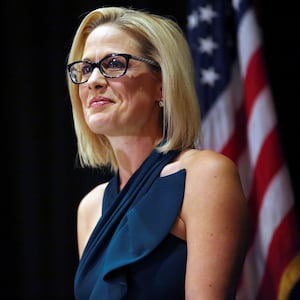Always have a “room temperature” bottle of water on hand for her at all times. Make sure you get her groceries. And book her a weekly, hour-long massage.
These are just a few of the tasks, framed in a dizzying array of do’s and don’ts, that have fallen to the staffers for Sen. Kyrsten Sinema (I-AZ), according to an internal memo obtained by The Daily Beast.
The 37-page memo is intended as a guide for aides who set the schedule for and personally staff Sinema during her workdays in Washington and Arizona. And while the document is mostly just revealing of Sinema’s exceptionally strong preferences about things like air travel—preferably not on Southwest Airlines, never book her a seat near a bathroom, and absolutely never a middle seat—Sinema’s standards appear to go right up to the line of what Senate ethics rules allow, if not over.
One section of the staffer guide explains that the senator’s executive assistant must contact Sinema at the beginning of the work week in Washington to “ask if she needs groceries,” and copy both the scheduler and chief of staff on the message to “make sure this is accomplished.” It specifies Sinema will reimburse the assistant through CashApp. The memo also dictates that if the internet in Sinema’s private apartment fails, the executive assistant “should call Verizon to schedule a repair” and ensure a staffer is present to let a technician inside the property.
The Senate ethics handbook states that “staff are compensated for the purpose of assisting Senators in their official legislative and representational duties, and not for the purpose of performing personal or other non-official activities for themselves or on behalf of others.”
Craig Holman, a congressional ethics expert with the nonprofit group Public Citizen, said Sinema’s apparent demands that staffers conduct personal tasks amount to a clear violation of Senate ethics rules, and would typically warrant a formal reprimand by the Senate Ethics Committee.
Sinema spokesperson Hannah Hurley told The Daily Beast that “the alleged information—sourced from anonymous quotes and a purported document I can’t verify—is not in line with official guidance from Sen. Sinema’s office and does not represent official policies of Sen. Sinema’s office.”
Hurley added that Sinema’s office “does not require staff to perform personal errands.”
The Daily Beast did not share the document itself with Sinema’s office, and is not printing it in its entirety over concerns that doing so may reveal who shared the memo. However, The Daily Beast was able to independently corroborate the veracity of the document, which is at least a couple of years old but could still reflect current policies.
The Daily Beast sent Sinema’s office a detailed list of claims and quotes sourced from the memo and intended for publication.
While the memo may not represent the most up-to-date scheduling practices for Sinema, the document reflects long-running guidelines as well as commitments of the senator’s that have remained consistent. Moreover, the memo is clear that, even if Sinema and her chief of staff never signed off on the document itself, both were to be alerted when the senator’s executive assistant had procured her groceries—or completed a number of other tasks.
Historically, Sinema has been far more averse to talking to press than her colleagues, though she has done a number of interviews recently following her departure from the Democratic Party and the passage of a same-sex marriage bill she helped to pass. Still, the scheduling memo offers a rare glimpse into how one of the Senate’s most inscrutable—and most scrutinized—members approaches her job and runs her office.
“Kyrsten works hard, but is protective of her personal time,” reads the very first paragraph of the document, which explains that Sinema has “time-consuming commitments outside of this job.” Those commitments seem to be a reference to her extensive schedule of training and competing in marathons and Ironman events—which are referenced numerous times in the memo—as well as her other job teaching classes at Arizona State University.
“Do not schedule anything, ever, outside of ‘regular’ work hours without first getting Kyrsten’s permission,” the document reads. “She will very, very rarely agree to work outside the regular hours, so only ask if it’s a big deal.”
The memo is clear that Sinema doesn’t start work before 8:45 a.m. and staffers should not schedule anything after 8 p.m. In fact, it specifies that the senator is “often not reachable” after 8 p.m. during the week, which would make her highly unusual among U.S. senators.
The document also makes clear that much of Sinema’s time outside of “regular hours” consists of exercising and training for athletic competition. “She wakes up very early to work out, and sleep is very important to her,” it says. The memo also specifies that on weekends, she “needs a later start to accommodate her training schedule,” which entails scheduling no work obligations earlier than 1 p.m.
Apparently, facilitating Sinema’s athletic schedule was a core duty for her official staff. The memo instructs aides to add Sinema’s races to her calendar and to “consult with her” on how much recovery time she will need afterward. “These activities are very important to her and should be protected,” it says.
Another section laid out in detail Sinema’s eating schedule. “Due to her very high level of activity, she is always hungry and needs to consume a lot of protein each day,” it reads, specifying that she has to eat between 12 and 12:30 p.m., 2 and 2:30 p.m., and 5 and 6:30 p.m. It states Sinema brings her own lunch and snack to work, but that she cannot be scheduled beyond 6:30 p.m. without staff “ensuring she has dinner.”
Sinema’s commitment to athletic pursuits also extended into regular hours. The memo explains that Sinema must be scheduled for two 45-minute physical therapy sessions during the week, even specifying that her work calls could be scheduled during those appointments. She also expected to be booked for a weekly hour-long massage, even if it were in the middle of the legislative workday, according to a former Sinema aide who spoke to The Daily Beast and was granted anonymity to describe the workings of the senator’s office.
Sinema was said to be so committed to her workouts that, ahead of trips, she would make aides check if hotels’ swimming pools had the exact right dimensions for her training purposes—a task that could consume hours.
A section outlining how to book Sinema’s air travel, meanwhile, is a veritable minefield of opportunities for a junior staffer to get crosswise with the boss.
“KS does not like to fly,” the memo reads, using the senator’s initials. “It is your job to make her as comfortable as possible on each flight.”
Unsurprisingly, some staffers found these instructions—and Sinema’s zeal in ensuring they were followed to the letter—to not only be onerous but detrimental to the overall staff’s mission to serve constituents, craft policy, and communicate that work to Arizona.
“When I look back, it’s unbelievable the amount of time staffers spent just to accommodate her,” said the former aide.
Capitol Hill has no shortage of bosses with sky-high expectations for staff, or with expectations for the perks they are entitled to as a member of Congress. The Arizona senator is also not the only lawmaker whose very specific instructions to aides have been made public.
In 2017, Politico published an eight-page memo for aides to former Rep. Todd Rokita (R-IN) that included almost comically elaborate and detailed instructions for staffing him, such as avoiding talking with him and refraining from “sudden acceleration” while driving him, as well as ensuring he always had a toothbrush, toothpaste, gum, and Kleenex on hand.
In recent years, other lawmakers, such as Rep. Alex Mooney (R-WV), have been subject to formal House Ethics Committee probes for, among other things, making official taxpayer-funded congressional staff conduct personal errands.
But the apparent level of time and effort from aides that went into ensuring that Sinema’s specific needs and preferences were met—on everything from when she eats to where she sits on a plane—makes her an outlier among members of Congress, especially those not in any position of leadership.
There is, for example, an entire section of the staffing memo devoted to explaining how to meet Sinema’s hydration needs:
<p>“KS drinks A LOT of water. Make sure to always have a room temperature bottle of water for her, whether she is in the office, at call time, or in someone's car. When someone is picking KS up from the airport, they should ALWAYS have a bottle of water for her… It is your job to remind whoever is staffing KS to have water for her.”</p>
On Capitol Hill, it is common to see even high-ranking lawmakers walk alone to and from their offices, or even stand in line alongside staffers for coffee or lunch. For many, flying in coach is a badge of honor—or political necessity. Occasionally spotting lawmakers doing their shopping at the neighborhood supermarkets is an amusing quirk of life in Washington.
But Sinema is not a typical senator—in many regards. In the last two years, her opposition to key aspects of the Democratic Party’s agenda have proved immensely frustrating to her colleagues. With her relationship to the party frayed—and facing a potentially daunting primary ahead of her 2024 re-election—Sinema announced this month that she would leave the Democratic Party and become an independent.
At the same time, Sinema’s last two years have been especially productive for a relatively junior senator. She was at the center of a bipartisan group that helped broker the $1 trillion infrastructure law and helped shepherd the first meaningful gun reform in decades through Congress. Along with Sens. Tammy Baldwin (D-WI), Susan Collins (R-ME), and Thom Tillis (R-NC), Sinema helped to get legislation codifying the right to same-sex marriage on President Biden’s desk last week.
“As her colleagues on both sides of the aisle will attest to, and her legislative track record makes clear, Senator Sinema is among the most hardworking and effective members of the U.S Senate,” said Hurley, Sinema’s spokesperson, in response to questions for this article.
The senator scrambles the common stereotype of a demanding Capitol Hill boss. She does not, for example, demand aides be accessible at all hours of the day and night, unlike some of her colleagues revealed to be particularly punishing bosses.
Instead, the memo paints a picture of a boss who expects the hours she does keep to be choreographed perfectly. “Kyrsten is very efficient and HATES wasting time,” it reads.
Sinema is described as so hyper-focused on the task at hand that staff need to constantly remind her exactly when to keep moving. “KS focuses wholly on whatever work she is doing at the moment (call time, meeting with constituent, etc) - it is your job to tell her when to transition to the next obligation,” it reads.
But her desire for to-the-minute efficiency for work obligations—compared to the time she set aside for other pursuits—leaves some questions about her priorities.
The document outlines that Sinema should keep all meetings with constituents in her D.C. office limited to a block on Wednesdays. Her former aide told The Daily Beast that Sinema would stack as many constituent meetings as possible, usually no longer than three minutes, into a half-hour period on Wednesdays.
That meant that Sinema likely spent more time during the work week in physical therapy appointments and massages than with constituents. The document also outlines that scheduling “coffee meetings with lobbyists and donors are fine” and to allot those 15 to 20 minutes—a comparatively lengthy stretch of time for a senator routinely scheduled down to the second.
The memo also describes Sinema’s intense fundraising activity, through both in-person events and making calls to donors. “Call time is incredibly important to KS,” it says, stating that Sinema asks for two to four hours of it on the schedule weekly. It also instructs staff to schedule fundraisers for Sinema in D.C. “within the regular work hours.” (“Kyrsten dislikes dinners because they run late and are expensive,” it explains.)
The need to dial for campaign dollars and press the flesh at D.C. receptions is a near-universal chore for members of Congress, and the amount of time Sinema spent fundraising is likely comparable to that of other senators.
But at home, Sinema has been criticized for skirting appearances with constituents while making time for donors and for the business community. In the last year, for instance, significant details about her attitude on key bills were revealed to press by Arizona business leaders who met with her privately.
The staffing memo makes clear that Sinema keeps a robust travel schedule for fundraising, official business, and personal commitments. The section on how to book her airplane seats are among the document’s most elaborate:
<p>“KS has Executive Platinum status on AMERICAN AIRLINES and sometimes receives an automatic upgrade to first class. Do not rely on this; in the event that she does not get upgraded, it is important that she have a seat she is comfortable with.First choice: KS prefers an aisle seat as close to the front of the plane as possible, except that she DOES NOT want the bulkhead row. Those seats are smaller than regular seats and are crowded. She also doesn't want the seat next to/directly in front of the bathroom on planes where there's a bathroom in the middle of the plane. Look at the seat map for every flight you book, or ask the booking agent about the flight map if you're reserving over the phone.KS generally prefers to be closer to the front in a window seat, than further back in an aisle. It saves her time getting off the plane earlier.Next choice: if you can't get an aisle seat, get a window seat using the same guidelines as above. This shouldn't happen often, since you're booking most flights six weeks in advance.Last resort: Do everything in your power not put her in a middle seat. If the circumstances are such that a middle seat is the ONLY option, make sure you email KS to let her know and also provide some information about other flights she might be able to take instead that have better seating options. Don't book so late that middle seats are all that's left.”</p>
In at least one small respect, however, staffing Sinema isn’t so intense. "Call her Senator when referring to her to a third party,” the memo reads. “When speaking directly to her, call her Kyrsten."










